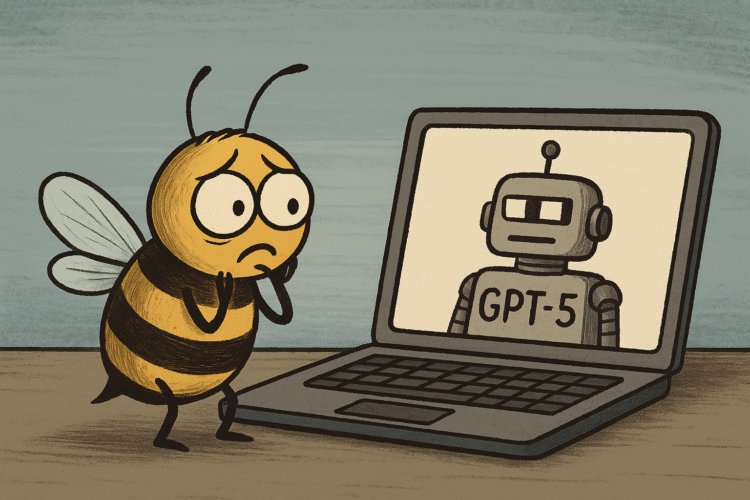
The launch of GPT-5 was not announced so much as revealed, the way ancient prophecies emerge from cracked temple walls or a Kardashian reveals a new product line—suddenly, everywhere, and without anyone asking if we were ready.
OpenAI calls it the “most advanced AI model to date,” a phrase that lands somewhere between a tech brag and a Bond villain monologue. The press releases talk about “unprecedented reasoning abilities,” “context awareness,” and “next-level creativity.” What they don’t mention is the quiet, universal dread humming under the surface, like the whine of an overworked refrigerator: Oh God, what will it do to us this time?
We’ve been here before.
Each generation of AI promises to be the one that changes everything.
GPT-3 gave us the illusion of having a well-read, moderately stoned intern at our fingertips.
GPT-4 promised sophistication—like hiring that intern’s older sibling who’s been to grad school and owns a French press.
And now GPT-5 shows up like the third sibling—the prodigy child who got a Rhodes scholarship, speaks nine languages, and, disturbingly, remembers everything you’ve ever told it.
Which is exciting… until you remember that GPT-5 is not a person. It’s an omnipresent hive of words that can mimic anything, from a recipe for banana bread to a breakup text in the style of Virginia Woolf. It doesn’t sleep. It doesn’t feel. And unlike your Rhodes Scholar cousin, it can’t be shamed into helping you move.
The hype machine is in full swing.
Tech journalists write breathless pieces about GPT-5’s “emergent properties” (translation: things even the engineers didn’t plan).
LinkedIn influencers are already posting pseudo-spiritual takes: “GPT-5 isn’t just AI—it’s a mirror to the soul.”
And Twitter is half in love, half convinced it’s the beginning of the end, which is pretty much Twitter’s default setting.
The rest of us are caught in the middle, wondering if this is the leap forward that will cure cancer or the one that will generate infinite fake news about how cancer has already been cured—by crystals.
Of course, OpenAI insists GPT-5 will be safer than its predecessors.
They’ve put in “alignment safeguards,” which sounds reassuring until you remember that “alignment” in tech speak often means “We told it not to do bad things, and we really hope it listens.”
We’ve heard this before.
We were told social media would “connect the world” and not radicalize our uncles.
We were told streaming services would “give us more choices” and not trap us in a forever-scroll of algorithmic sameness.
And we were told that AI models would “assist” us, not quietly start replacing half the workforce by writing better marketing copy than the people who went $120k into debt for a communications degree.
The demos of GPT-5 are both dazzling and unsettling.
It can draft a screenplay.
It can simulate a therapy session.
It can explain quantum physics in the voice of RuPaul.
It can generate convincing legal arguments, which is great until you realize it can also generate convincing legal arguments for things that should not, under any circumstances, be argued for.
One journalist asked it to write a resignation letter for a politician caught in scandal, and it delivered something so perfect, so politically calibrated, that the real question became: Why are we letting humans write these things at all?
And yet, here’s the reality: AI advancement always promises revolution, but mostly delivers… convenience.
We were told self-driving cars would end traffic fatalities. Instead, we got rides that sometimes refuse to move because they think a shadow is a physical object.
We were told blockchain would decentralize power. Instead, we got NFTs shaped like cartoon apes.
GPT-5 will no doubt do incredible things. But for most of us, it will live in the margins: answering emails, summarizing reports, helping students cheat on essays in more sophisticated ways. It’s the kind of progress that feels like magic until you realize most of it is just making capitalism more efficient.
There’s a bigger question here—one that gets lost in the hype cycles: If GPT-5 really can think, write, and create better than us, what happens to all the messy, inefficient, human-shaped parts of life?
Do we still write bad poetry just to feel something?
Do we still stumble through awkward first drafts of love letters when the AI can craft the perfect one in seconds?
Do we still learn to fail, or do we outsource failure too?
Because if we do, what’s left for us besides consuming what GPT-5 produces? And if that’s the future, then congratulations—we’ve invented an all-powerful machine whose primary function is to keep us sitting still.
The irony, of course, is that GPT-5 will probably read this blog post one day.
It’ll understand my tone.
It’ll note my cynicism.
It might even be able to improve on it.
Which means that someday soon, you might get satire that feels sharper, funnier, and more resonant than this—written entirely by the thing I’m satirizing. And you might like it more.
And maybe that’s the point.
Final Thought:
Every leap in technology asks the same question: Are we in control, or are we just along for the ride? GPT-5 doesn’t feel like an intern anymore—it feels like a co-pilot. The problem is, I can’t tell if it’s flying the plane toward the future… or just really convincing us that turbulence is part of the plan.